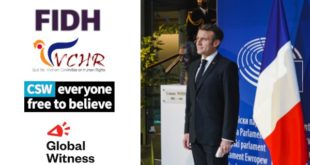
Vietnam’s human-rights record will come under scrutiny tomorrow at the United Nations Human Rights Council. Hanoi is hoping the council, which includes Cuba and Saudi Arabia, will rub clean its murky record on human rights. Freedom-loving countries shouldn’t let this happen.
Vietnam’s report to the Human Rights Council in preparation for this review paints a glowing self-portrait of the Communist nation as a “rule-of-law state of the people, by the people and for the people.” But human beings are absent from Vietnam’s concept of human rights. The document extols political stability over political rights. The “most sacred” human right, states the report, is the right to independence won by the Communists under Ho Chi Minh. It also claims Vietnam should be an exception to universal human-rights rules.
If the U.N.’s review of Vietnam is to be effective, it must instead examine the reality on the ground. In Vietnam today, all independent civil society voices are suppressed. In a crackdown on peaceful demonstrations in September 2008 scores of cyber-dissidents, journalists, labor activists and religious leaders were arrested. Most are detained under vaguely defined “national security” provisions in the Vietnamese penal code, which contains such Kafkaesque offences as “undermining the unity policy,” “sowing divisions between religious and non-religious people” and “abusing democratic freedoms to encroach upon the interests of the state.” Thus, lawyers like Nguyen Van Dai and Le Thi Cong Nhan are serving four and three years in prison, respectively, for organizing training sessions on human rights.
The government controls all media and press freedom is muzzled by an arsenal of censorship laws. In 2008, two journalists were arrested for exposing a major corruption scandal involving top government officials. One was sentenced to two years in prison (although he has since been released). The other was sentenced to house arrest. Several others were sanctioned or fired. Squads of “cyber-cops” censor the Internet, and a circular on blogs released in December 2008 prohibits all criticism of the Party or state.
Restrictions on religious freedoms are pervasive. Vietnam’s largest religious body, the Unified Buddhist Church of Vietnam, remains outlawed and its members routinely detained and harassed. The group’s leader, Thich Quang Do, a 2009 Nobel Peace Prize nominee, is in his 27th year in detention. Hanoi’s violations of religious freedom over the past year prompted the U.S. Commission on International Religious Freedom last week to recommend Vietnam’s redesignation as a “country of particular concern.” Arbitrary detention, torture, the restrictive household registration system, sex-trafficking and coercive birth control policies are all issues that must be aired during Vietnam’s review tomorrow.
To avoid criticism, Vietnam is mobilizing its cronies to swamp the debate with praises, and counting on endorsements from regional allies and members of the “axis of sovereignty,” a group of U.N. members including China, Cuba, Russia, Sudan and Iran. Since only 45 states can intervene at the session, and speaking order is on a first-come first-served basis, Vietnam is urging its friends to queue up from 6 a.m. to ensure they take the floor.
Instead of yielding the floor to autocrats, democratic governments from east to west should seize this opportunity to make concrete recommendations for improvement in Vietnam. This is the only way to ensure that the U.N.’s review process truly helps to advance human rights, and does not serve merely as a “cover” for the Hanoi regime’s impunity.
Vo Van Ai
Mr. Ai is president of the Vietnam Committee on Human Rights and international spokesman of the Unified Buddhist Church of Vietnam.
This post is also available in: Vietnamese
 Quê Me Quê Me: Action for democracy in Vietnam & Vietnam Committee on Human Rights
Quê Me Quê Me: Action for democracy in Vietnam & Vietnam Committee on Human Rights




